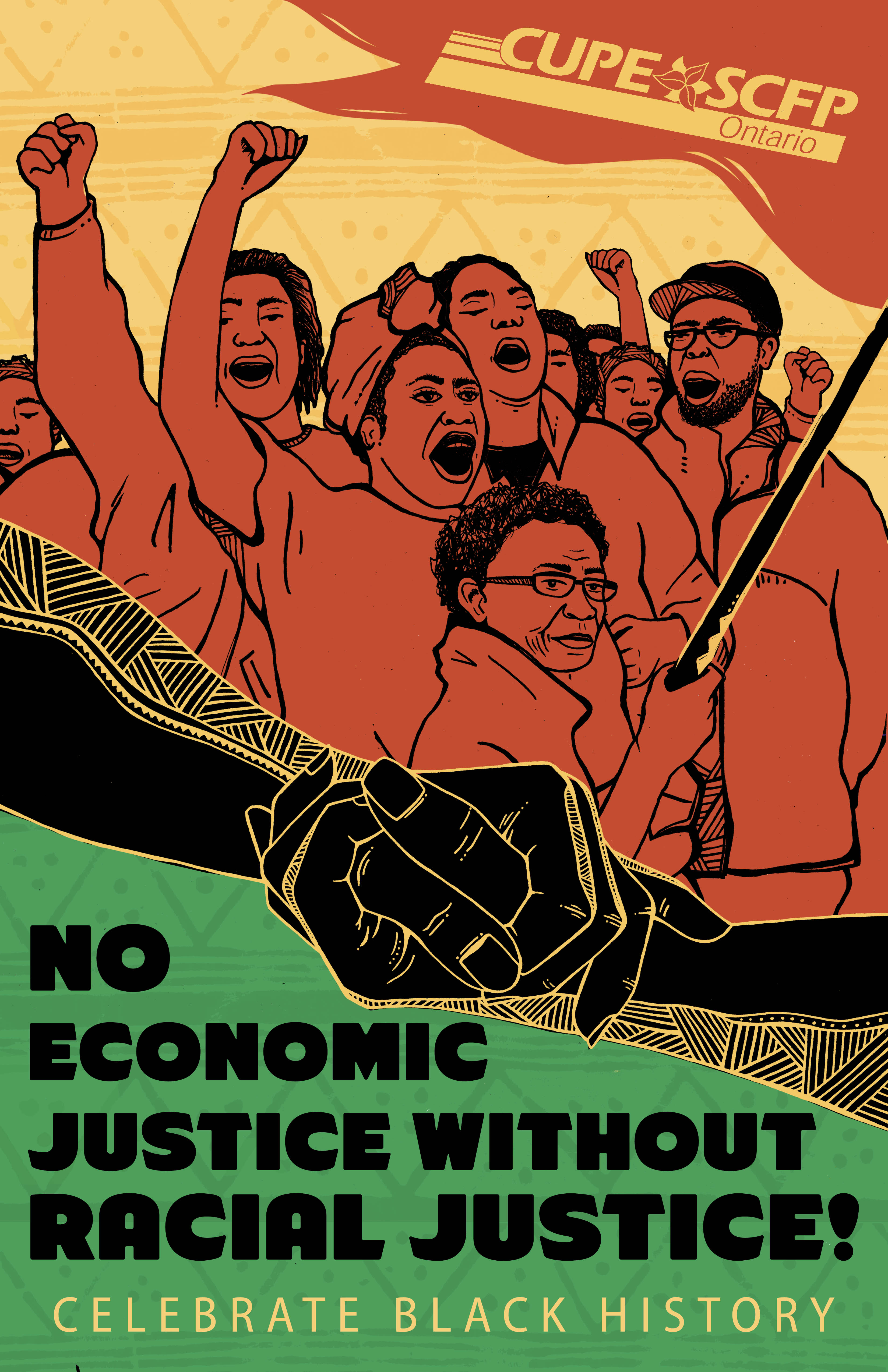Poster credit: Amber Williams-King

Black History Month is a time to reflect on the contributions and legacy of Black people in our workplaces and communities and to tell those stories which too often go untold. Celebrating Black History is also a time to recognize the importance of resistance and struggle and to reaffirm our commitment to dismantling anti-Black racism in the labour movement and society.
It is important to remember that unions once banned Black members. The Brotherhood of Sleeping Car Porters (BSCP) was a leader in reversing this discriminatory practice. Born in 1918 in Toronto, Stanley Grizzle was elected president of his union local and pushed the Canadian Pacific Railway to open management to Blacks. In 1959, Grizzle and Jack White were the first Black candidates to run for election to the Legislative Assembly of Ontario for the CCF. Jack White was also the first elected Black representative of the Ironworkers, and one of the first Black CUPE national staff representatives.
CUPE, founded in 1963, worked to improve its record on anti-Black racism over the years. In 1977, it developed the first affirmative action manual for locals: Equal Opportunities at Work. In 1980, the CUPE National Executive Board appointed CUPE’s first Equal Opportunities Officer. The 1981 convention pledged to fight racism, anti-Semitism, and anti-gay bigotry. The 1980s saw CUPE locals seeking bans on pension fund investments in apartheid South Africa and a boycott of South African goods by hospitals, municipalities, nursing homes, schools, and universities. A visit by Nelson and Winnie Mandela to CUPE National in 1990 sparked a fund to support the democracy movement in South Africa.
The 90s and 2000s saw further initiatives by CUPE for mandatory pay and employment equity laws, the hosting of the first ever CUPE anti-racism conference, forums for members and staff to develop anti-racism plans of action, the formulation of policy papers on racism and employment equity, the creation of more diversity sets on the National and Ontario Executive Boards, presentations at division conventions to make employment equity a bargaining priority, and support for the Black Lives Matter movement.
Despite these measures, Black CUPE members have often been discriminated against in our movement—whether facing employment barriers, racially motivated hate speech, a lack of leadership positions and CUPE staff positions, or disregard for their issues and concerns as racialized workers. These facts attest to the persistent nature of anti-Black racism within our movement and society at large.
CUPE Ontario remains committed to eliminating anti-Black racism in our communities and our movement. Our 2018 Convention mandated the creation of an Anti-Racism Organizational Action Plan (AROAP) and external anti-racism action plan to tackle anti-Black racism within CUPE itself and among our members and the communities they live in. This plan will be implemented over the course of 2019. CUPE Ontario and the CUPE Ontario Racial Justice Committee are also working with others to organize campaigns to combat white supremacy on campuses, support grassroots anti-racism movements like Black Lives Matter, and resist Ford PC government policies that hurt racialized workers and communities.
There are those who would have us believe that the fight against racism in Ontario is well on the way to being won. Yet a 2018 report from the Ontario Human Rights Commission finds that Black people have been “grossly overrepresented” in incidents where police used force resulting in injury or death. The rise of far-right politics represented by the likes of Donald Trump and Doug Ford has emboldened extremists to air racist, Islamophobic, and anti-Semetic views. According to Statistics Canada, hate crimes reached an all-time high in 2017. Racialized communities also continue to face high levels of poverty: while the overall poverty rate in Canada is 11%, for racialized persons it is 22%.
While Ontario supposedly banned the arbitrary collection of I.D. based on race—a practice known as carding—police are still free to card while investigating crimes or during traffic stops. Moreover, there is no formal federal ban on racial profiling. Racialized folks are over-represented in our prison system and underrepresented in economic, social, and political life.
The Conservative government’s rhetoric and policies disproportionately impact racialized communities. Premier Ford has cut funding to the Anti-Racism Directorate and said he doesn’t support discrimination but feels that “certain carding is required.” During the 2018 provincial election, Ford turned his back on the first official provincial leadership debate organized by the Black community. In December 2018, Ford cut millions in funding for specialized programs, many of which help at-risk youth from racialized communities. His backtracking on key labour reforms under Bill 148, including the cancellation of the $15/hr minimum wage, has disproportionately impacted racialized workers.
This Black History Month, we are mindful of the legacy and contributions of Black Canadians and the rich history of resistance that we rely on today as we continue to build power to fight anti-Black racism. Ultimately, the history of Black Canadians underscores that the quest for racial and economic justice are intertwined. CUPE Ontario will be remembering that history as it seeks to dismantle barriers to the full participation of Black members in our union and in our workplaces.
